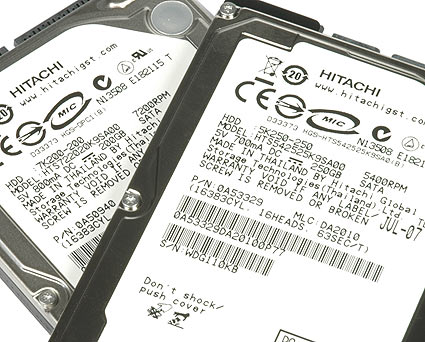TravelStar 7K200 and 5K250 Beat the Band
Hitachi Climbs The Notebook Hard Drive Olympus
250 GB notebook hard drives have been around since June of this year, when Western Digital launched its latest WD2500BEVS Scorpio drive. But others followed quickly: Samsung also has a 250 GB model, the Spinpoint M5S HM250JI, and Fujitsu has the MHY2 that we haven't reviewed yet. The same applies to Toshiba's 46GSX series, and Seagate is ramping up its fourth generation Momentus, the 5400.4. But for now, it is Hitachi that wants to take the 2.5" notebook drive crown. The Travelstar 7K200 is aimed at outperforming its competitors, while the 5K250 is positioned to deliver both high performance and maximum capacity Compare Prices on Travelstar 7K200 Drives.
The performance differences in the 3.5" desktop hard drive segment have been less significant than advances made in the 2.5" notebook drive space. Drive manufacturers that offer terabyte capacities have been in the news more than others, as these drives and their brothers with smaller capacities are the fastest choices today. However, selecting the ideal notebook hard drive has become more difficult, as high capacity doesn't automatically mean that you will also get the highest performance. Some 2.5" drive makers, such as Fujitsu, Hitachi, Seagate and Toshiba, have both 7,200 RPM drives for the performance-savvy customer and 5,400 RPM models to offer the maximum capacity of 250 GB on two platters. The faster drives are still limited to 200 GB (Hitachi, Seagate, Toshiba) or to 160 GB (Fujitsu).
In addition to the recent performance and capacity jumps in the 2.5" space, two technologies have emerged that make it increasingly difficult for enthusiasts to select the right hard drive solution. Hybrid hard drives (H-HDDs) provide an additional 256+ MB of Flash memory to buffer operating system data and frequently used application data. These drives are meant to reduce waiting times for the user, and also reduce power consumption by working off the Flash memory and switching off the spindle motor when it's not needed. Samsung and Seagate already have H-HDDs, but they require Windows Vista to play their Flash card, and the benefit is still small.
The second technology to compete with mechanical hard drives builds entirely on Flash memory to create ultra-fast Flash Solid State Drives (SSDs). We looked at a first Samsung Flash SDD 32 GB prototype last year and, at a first model that is available at retail, SanDisk's SSD SATA5000, also holding 32 GB. These Flash SSDs provide exceptional read latencies and good to excellent throughput, but they suffer from long write latencies. In fact, write latency is several times longer than the access time we get from conventional hard drives. Paired with the high cost of $250 and up for only 32 GB, Flash SSDs aren't necessarily the ultimate choice for performance users, given that Windows Vista alone eats up approximately 10 GB.
In the end, the classic hard drive doesn't look all that bad, as the latest generation delivers almost 60 MB/s (5,400 RPM) or 70 MB/s (7,200 RPM) at only $180 and $200 retail. In contrast, you should be prepared to fork out at least $350 for a 32 GB Flash SSD and more than ten times as much for the 128 GB Supertalent drive, which we'd consider spacious enough for enthusiasts.
Join our discussion on this article!
Get Tom's Hardware's best news and in-depth reviews, straight to your inbox.
Current page: Hitachi Climbs The Notebook Hard Drive Olympus
Next Page Get The Latest Models!
Patrick Schmid was the editor-in-chief for Tom's Hardware from 2005 to 2006. He wrote numerous articles on a wide range of hardware topics, including storage, CPUs, and system builds.
